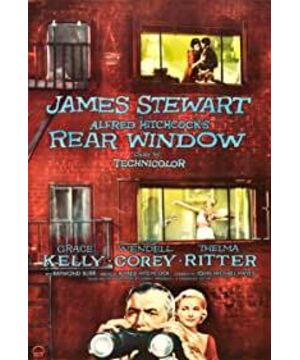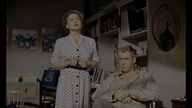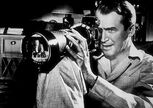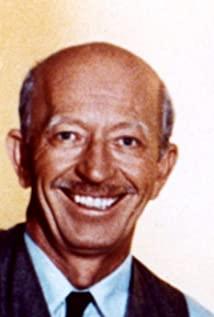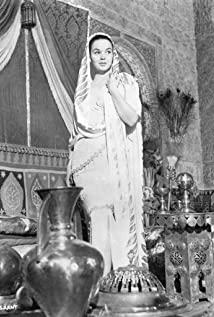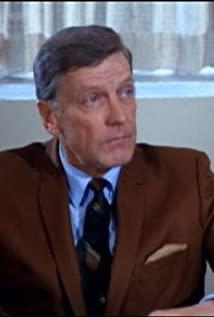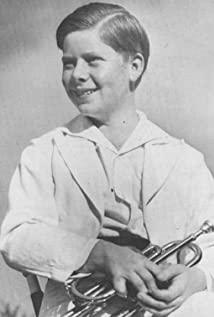When you have to stay at home for some reason, what do you generally choose to do? Reading books and playing games? or……
In Hitchcock 's film " Rear Window," a journalist, Jeffries, who has to stay in bed for a broken leg, is hot and extremely bored, and begins Looking at the lives of the families in the residential building opposite. During this time, he appears to have observed a homicide.
Said to be watching, in fact, the direct point is " peeping ".
Hitchcock was smart enough to choose James Stewart for the voyeuristic role. His handsome, decent and gentle image made the audience feel a little disgusted and resisted when the act of peeping appeared, but they did not feel too wretched and accepted such an action. Coupled with the fact that he is a reporter in the film, we also think that it is just the professional instinct of a reporter to "search for the truth".
The film uses a lot of subjective shots. The eyes of the male protagonist are the eyes of the audience. With the movement of his eyes, we also quietly felt the fun of voyeurism. When we continued to look down curiously, we were also slapped by the director: "Look! Stop pretending, everyone has a desire to voyeur!"
Although Stella, the nurse who took care of him, and his girlfriend, Lisa, were initially opposed to such voyeurism,
But in the end, he also unknowingly took the initiative to join the voyeur army.
It's like watching the film, expecting Jeffries to keep peeping and catch the killer. As it turns out that there was a murder, the moral lines of voyeurism seem to blur. But how to measure the moral standard of this behavior itself, the director did not give a clear statement. (Actually, Jeffreys, who is a voyeur, also had an inner struggle and reflection.)
Of course, in the process of finding the real murderer, Jeffreys broke another leg for this, which is also the price of voyeurism?
Although these characters outside the window are presented from a long-term perspective, we as audiences do not feel far away. First of all, thanks to actor Stewart for his superb acting, as he spends the entire movie lying in a chair, showing all sorts of different emotions with just his facial expressions, driving the plot forward. However, in addition to the performance of the actors, it is also due to Hitchcock's use of film technology. In 1918, the former Soviet director and film theorist Kuleshov proposed a film phenomenon known as the Kuleshov Effect . He shot a deadpan close-up of the famous actor Mozi Yousin and edited it side by side with a bowl of soup, a coffin in which the deceased was placed, and a woman lying on a sofa.
During the viewing process, the audience thought that Moziyuxin's acting was very good, showing feelings of hunger, sadness and joy respectively (but it was actually the same expression). From this, Kurishov believes that " a single shot is just a material, and only the creation of montage is called film art ". In other words, it is not the content of a single shot that causes emotional reactions, but the juxtaposition of several shots, that is, the power of editing.
When Hitchcock later talked about "Rear Window", he also mentioned the technicality of the filming: " A man who can't walk looks out the window, this is the first level of the film; the second level shows what he has done. Seeing things; the third level expresses his reactions. This is the purest way of expressing the idea of cinema as we know it. ”
This is how the editing is used a lot in this film: we first see Jeffreys' expression,
Then he observed the scene in the residential building opposite,
The final shot returns to Jeffreys' face again, and the audience can feel the change in his mood.
Therefore, the actor's own acting skills and skillful editing techniques make the emotions of the characters meticulous.
Although it is a suspense film, the director still injects a lot of humorous bridges into it. The love between the male and female protagonists plays an important role in this film. At the beginning of the film, Jeffries expresses how unsuitable he and this girlfriend are.
The reporter, who has lived through all kinds of extreme conditions, has occasionally sneered at Lisa's romantic feelings, both in person and in private.
The most classic line is when they heard the pianist opposite finally compose a wonderful tune. Lisa lay by the window and sighed: "Where did he get the inspiration to write such a tune?" Jeff faintly "From the landlady, once a month."
Just a dialogue shows the " reality and romance " represented by the male and female protagonists so aptly. In Hollywood in the 1950s, female characters were always the object of male gaze, and Hitchcock's films were no exception. For example, his consistent use of the so-called "Blonde Goddess" has always been talked about. Grace Kelly (Grace Kelly) has also become a classic image in Rich Hitchcock's films.
However, this "Lisa who doesn't wear every dress a second time" is not a "vase" under the gaze of a traditional male, but an independent woman.
Lisa has her own attitudes towards lifestyle, work content, and love, and will not change her views in order to cater to men. In the film and Jeffries also had a lot of equality arguments. In addition, Lisa's fields and perspectives of observation are of great help to the progress of the case.
She was very thoughtful and found several details that neither Jerryris nor the police could find. Compared to Jeffreys who can only stay in bed to observe the opposite apartment (male characters become a vulnerable group), he finally bravely broke into the suspect's apartment to obtain decisive evidence.
In addition to the heroine, the other female characters in the film also have their own merits. In the context of that time, we were fortunate enough to experience the existence of some female power. (Although women are still portrayed from a male perspective throughout the film) Hitchcock showed us all kinds of life in just one residential building in 1954. Both technology and content are outstanding. Of course, there are all kinds of suspense films on the market today, which makes many viewers shout "disappointment" after watching "Rear Window". I would like to say, first of all, because Hitchcock's elements have been imitated by later generations, so that the audience will feel that they have "seen it"; secondly, the purpose of suspense films is not just to "play inversions", Maybe you guessed the ending, maybe you didn't, but that's not the most important thing, Hitchcock may just be trying to see our own hearts through the window of others .
Perhaps this is also the reason why this movie is worth pondering over and over again, no matter how many years it has gone through.
Think again, isn't " watching a movie " just a way to vent our voyeuristic desires?
View more about Rear Window reviews


